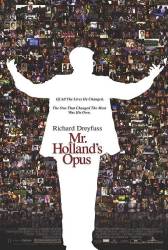Corrected entry: There is a scene where Mr Holland discusses Beethoven with his students and the camera pans over a record player. The camera is reflected in the sheen of the record.
Corrected entry: When Mr. Holland is helping Gertrude Lang with the clarinet, her hands are in the wrong spot. The left hand is where the right hand should be, and the right hand is where her left should be. You can not play the clarinet this way.
Correction: I rewatched that scene and her left hand is always higher on the clarinet than her right hand. This is the proper way to play a clarinet.
Corrected entry: After Mr. Holland performs a concert for his son's school for the deaf, the audience bursts into applause. But deaf people do not clap in applause, they wave their hands (it is more visually energetic). Since most of the audience was deaf students and teachers, there really should have been a lot of waving, and only a few sparse clappers. But I'm sure that would have sounded awkward and anticlimactic for this very emotional scene. Given the research the filmmakers put into ASL, I'm sure they were aware of this, but opted for the clapping to suit the typical (hearing) movie-goer.
Corrected entry: When Mr. Holland is rushing to the hospital in the car, he turns sharply an the hubcap comes off. In the next scene he turns again, and the hubcap is back on.
Correction: Only one hubcap comes off and you can't tell which tire it falls off. When they show that side of the car again, you can only see one tire.
Corrected entry: In the shot where Mr. Holland and Stadler are at Louis Russ's funeral and the 21-gun salute begins, the camera visibly shakes.
Correction: Not necessarily a mistake. If you've ever been near a 21 gun salute, or a cannon salute, a person standing near may be shaken by the vibration. Since a camera can be represented as a viewer's eyes, it is not a mistake if it moves as well. If it fell over or something, sure, but not a shake from vibration or percussion.
Corrected entry: The side of the Holland's moving truck says Superior Fast Freight. Freight trucks only carry consumer goods and wouldn't be used as a moving truck. (00:36:40)
Correction: Not necessarily true. My ex-husband works for an insulating company, and he has used his work truck to help me move 3 times just as a favor, because the truck he drives is perfect for moving.
Corrected entry: In the scene where Mr. Holland plays the Lovers' Concerto/Minuet in G, he tells the class that this piece is a perfect example of the Dorian Mode. It is actually an example of the Ionian Mode. In any case, Minuet in G is not really an example of modal music, as it is written in a diatonic major key.
Correction: Nope. He says "both are examples of the Ionian scale".
Corrected entry: Mr. Holland has to ask for Rowena's name (as if he had never seen her before) during her audition for the Gershwin review. A couple of scenes later in the coffee shop, she reveals to him how much she enjoyed his class and his sense of humor. Surely he would have remembered having her in class for a year - especially someone as interesting and talented musically as her?
Correction: Rowena might never have spoken up in class. Mr. Holland has taught for many years at this point and he may not necessarily remember all of his students.
Corrected entry: When Mr. Holland is helping Getrude Lang with the clarinet she mentions that her brother has a football scholarship to the University of Notre Dame. Notre Dame doesn't give football scholarships, only academic.
Correction: Wrong. Notre Dame absolutely does give football scholarships.






Correction: Reviewed the entire scene 3 times. No camera reflection in either of the 3 shots of the rotating record.